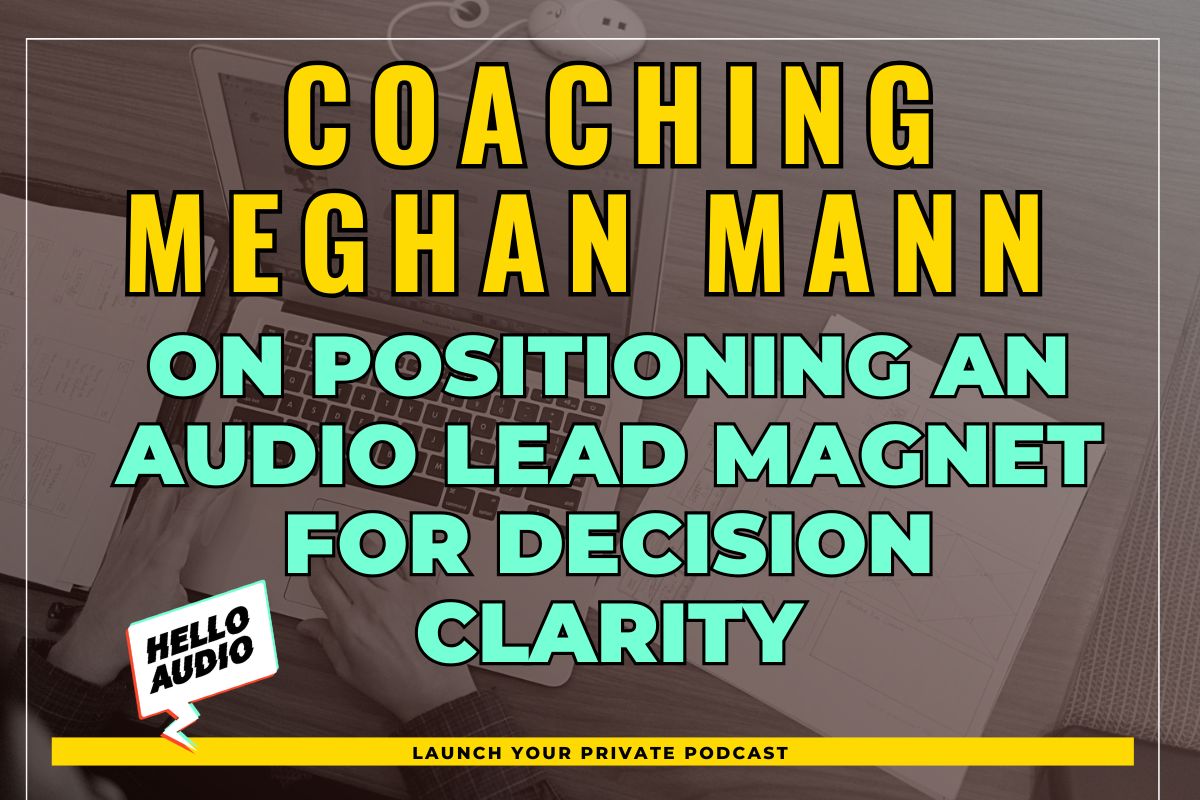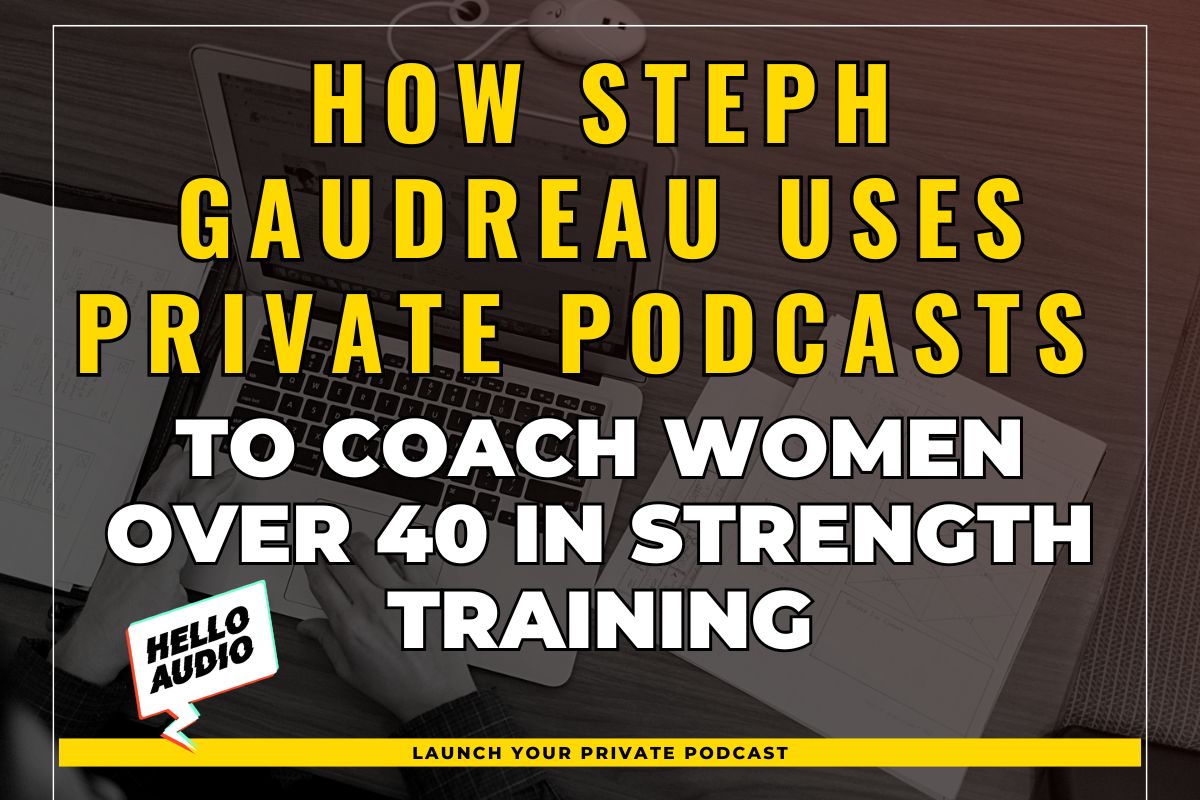Once you’ve recorded and fine-tuned your company podcasts, what’s next?
You need a hosting solution to store and deliver your private podcasts to your team or distribute your company content to the public.
However, shopping for one can be mind-boggling.
That’s why we’ve put together our top 5 corporate podcast hosting sites, the benefits of corporate shows, and how to create one.
TL;DR – Top Corporate Podcast Hosting Solutions
Check out the top 5 corporate podcast hosts. We’ll discuss each one in detail below.
- Hello Audio
- Libsyn
- Transistor
- Podbean
- Simplecast
Hello Audio takes the top spot.
Our platform lets you create private corporate audio feeds from your existing media files, such as meetings, webinars, Zoom recordings, event replays, and more. It then automatically delivers the private podcasts to listening platforms like Spotify, Apple Podcasts, and more.
So, what are you waiting for?
Get our 7-day trial for free to create, publish, manage, and measure your corporate private podcasts.

What is Corporate Podcast Hosting?
Simply put, corporate podcast hosting is the bridge between your company podcast and the listener. A podcast host allows you to upload, store, and distribute your audio feeds to your listeners.
You can either opt for:
- Internal corporate hosting service that stores and delivers exclusive content to your employees via a secure private RSS feed.
- External corporate hosting solutions that distribute your brand content to a broader audience, including potential customers and enthusiasts.
Benefits of Corporate Podcasts
Are external and internal corporate podcasts effective?
Here are the benefits of internal corporate podcasting:
- Makes the onboarding process seamless by introducing the company policies and values in an engaging way.
- Convenient for your team to consume content on their schedule — wherever and whenever they want.
- Helps your employees learn more about your company’s executives and leadership, humanizing your business’s mission and vision.
- Share sensitive information since it’s secure and can only be accessed by authorized personnel.
- Significantly boost engagement and team connection compared to traditional communication methods like emails.
Let’s take a quick look at the benefits of external corporate podcasts:
- Allows you to demonstrate your expertise and showcase your brand as a thought leader with valuable information.
- Lets you build meaningful connections with your listeners by sharing insights and stories.
- Differentiates your brand from the crowd, boosting your brand visibility.

Key Features to Look for in a Corporate Podcast Hosting Platform
While there are many podcast platforms out there, they offer different features and functionality.
So, keep these 6 factors in mind when choosing the best platform:
1. User-friendly Hosting
Ideally, you want a platform with an intuitive, easy-to-use dashboard.
It should provide detailed video (and screenshot) guides to get you started quickly and offer additional help, including chat support and a Facebook community group.
A good podcast host should distribute podcasts to directories like Google Podcasts, Stitcher, Spotify, Podchaser, and more.
2. Private Podcasting
Sometimes, you might want to make internal company announcements and discuss employees’ achievements privately.
In this case, choose a platform that allows you to create and manage private podcast RSS feeds. Check if it has top-level security measures, allowing you to set permissions and manage access.
3. Advanced Features
Your hosting service should help you launch and manage your podcasts easily.
For example, you should be able to trigger specific actions based on your listeners’ actions, like completing an episode.
Segmenting your audience with tags is also a great feature. It allows you to target the right audience and insert unique ads.
4. Integration with Other Tools
An enterprise podcast solution should have excellent features and integrate with other tools to enhance its functionalities.
Depending on your specific needs, your hosting solution should support integration with monetization, marketing, and analytics tools.
5. Comprehensive Analytics
You must understand your listeners’ behavior to grow engagement and create content that resonates with them.
Consider a hosting platform that provides podcast metrics like the number of plays and popular episodes.
6. Content Repurposing and Built-in Transcription
Automatic transcription and content repurposing services are great add-ons — without adding extra tools to your company’s tech stack.
Repurposing lets you create corporate podcasts from meetings, Zoom recordings, event replays, and even TikTok videos. Transcription can also boost your SEO, increase visibility, and reach listeners with hearing impairments.
Quick Tip! Hello Audio is an all-in-one private podcasting solution with all these features.
You can create and share exclusive content with members and employees in minutes. Our platform also auto-delivers private RSS audio feeds to major podcast directories like Spotify.
We offer in-depth analytics about your podcast, and our integration with Zapier lets you automatically add and remove listeners. Sign up for our free trial today.

Top 5 Corporate Podcast Hosting Solutions
There are many enterprise podcast solutions for hosting your podcasts, but which one is right for you?
Here are our top choices to consider:
1. Hello Audio
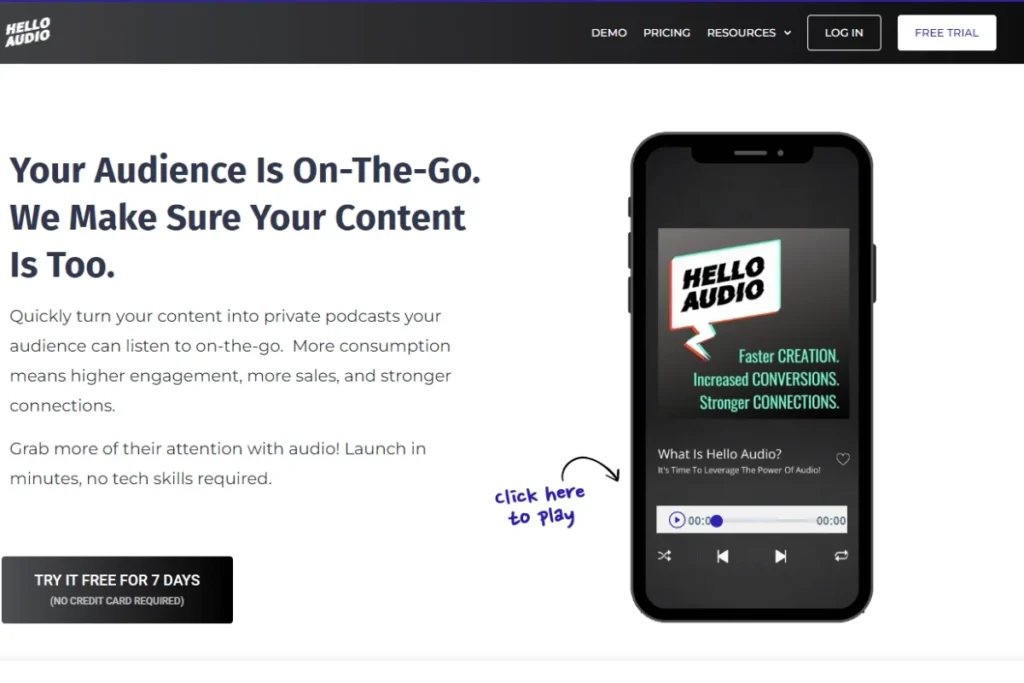
Our top pick is Hello Audio, the best hosting platform for publishing private corporate shows.
Check out some of our key features:
- Incredibly easy to use — you don’t require technical expertise.
- Distribute internal podcasts to major streaming platforms like Spotify, Overcast, and Google Podcasts.
- Integrates with tools like Zapier to automate adding or removing listeners.
- Offers advanced automated actions.
- Provides comprehensive podcast stats on each episode.
- Automatic podcast transcription.
So, why not try it yourself? Request an instant demo and see Hello Audio in action.
2. Libsyn
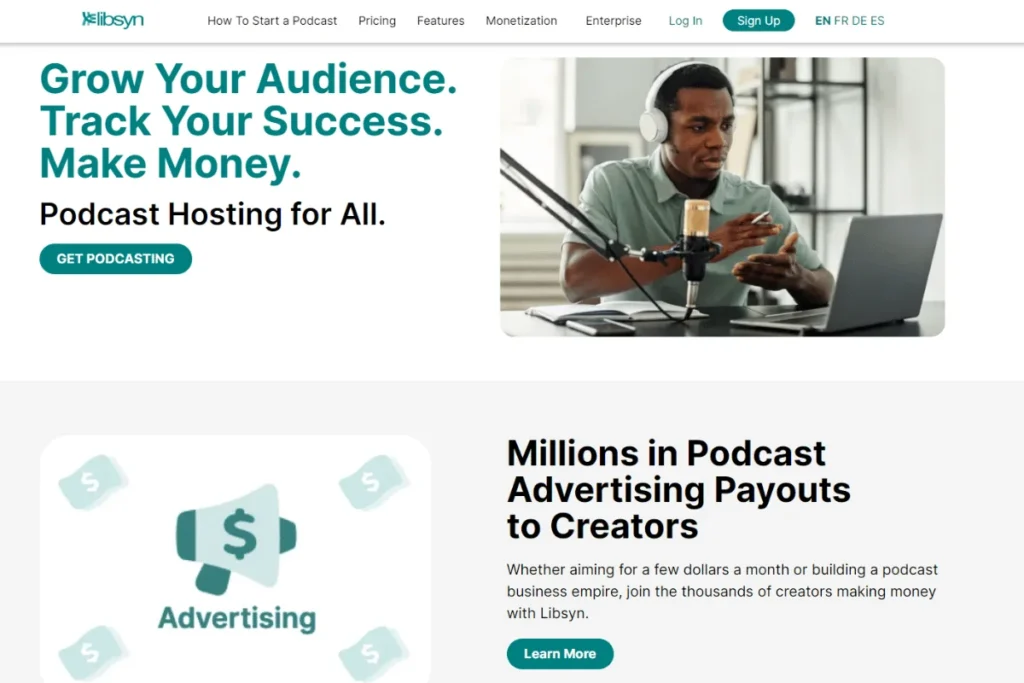
Libsyn is a platform that allows you to create, host, and distribute your company podcasts.
Some of its features are:
- Allows you to record and edit your podcasts.
- Ideal when you’re interviewing guests remotely.
- Integrates with Canva to help you personalize your podcast cover.
- Provides detailed podcast analytics.
- Offers monetization options through ads and subscriptions.
- Has a WordPress plugin to enable you to share your podcast on the website.
Lisbyn, however, lacks a free trial and is less user-friendly than Hello Audio.
3. Transistor
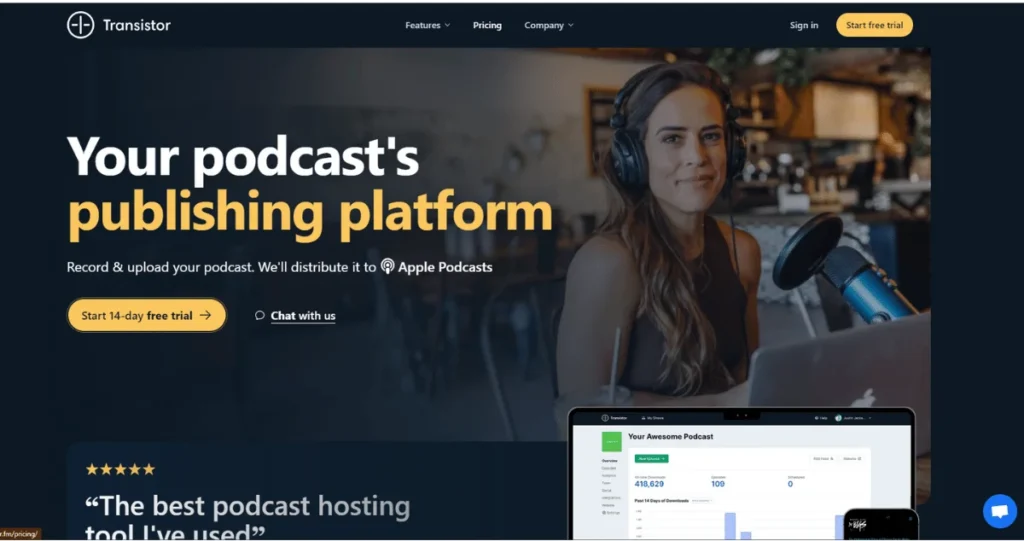
Transistor allows businesses to host, distribute, and manage corporate podcasts.
Check out some of its key features:
- Supports unlimited team members.
- Enables publishing your podcasts on major streaming sites like Spotify and YouTube.
- Provides analytics to show the popular episodes and the apps the listeners used.
- Lets you build a customizable podcast website.
However, Transistor falls short in internal podcasting compared to Hello Audio. It also lacks built-in editing tools.
4. Podbean
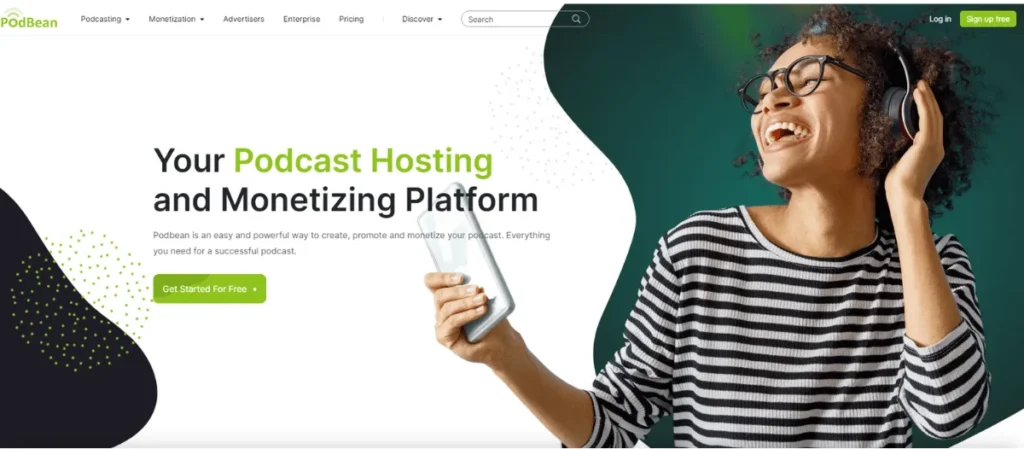
Podbean is a corporate hosting and monetization platform.
Some of its key features include:
- Distributes podcasts to significant podcast directories.
- Offers detailed listeners’ analytics to help you make informed decisions.
- Lets you publish and manage podcasts on your phone through the Podbean app.
- Has an easy-to-use interface, ideal for beginners.
- Allows subscriber-only content and different ad insertions.
- Listeners can also support you directly through the patron program.
- Provides a user community, which is good for networking.
On the downside, you must pay an additional fee for automated transcriptions.
5. Simplecast
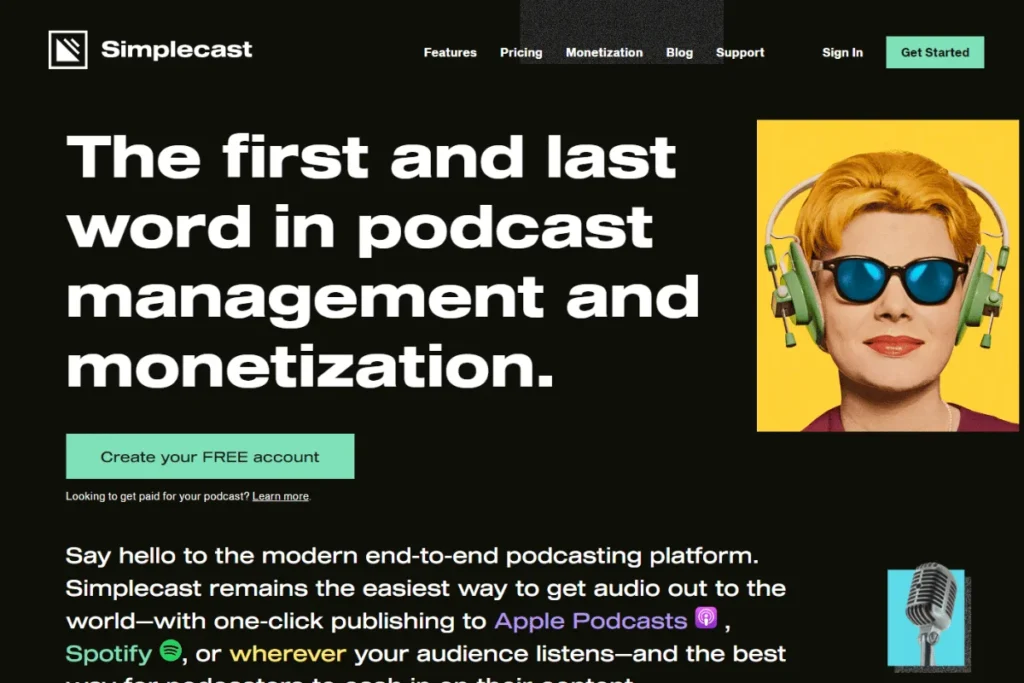
Simplecast is an end-to-end podcasting platform that lets you publish to Apple Podcasts, Spotify, and other listening apps.
It has features like:
- Comprehensive analytics of your listeners’ behavior and the performance of each episode.
- Integration with third-party platforms like Mailchimp.
- Building a personalized podcast website.
- Has a tool — Recast — to create short clips for social media.
Compared to Hello Audio, Simplecast’s private podcasting functionality is too narrow to be worth it.
Step-by-Step Guide to Launch a Successful Corporate Podcast
Want to launch your first corporate podcast?
Here’s a 5-step guide:
1. Plan Your Podcast
It’s easy to get hyped about launching your podcast, but spend enough time planning your podcast show:
- The first step is to conduct surveys to determine whether your intended audience is interested in a podcast from you.
- The next step is to have a clear goal. For example, do you want to boost your company’s visibility, establish thought leadership, or communicate with your employees?
- Decide on the format of your podcast, whether it’s a roundtable, conversational, interview, or a solo show.
- Lastly, research existing podcast shows in your niche and learn from their successes and mistakes.
If you don’t plan, your podcast might fail.
2. Outline the Podcast Episodes
Once you’ve picked the proper structure that resonates with your audience, it’s time to write your podcast script and mix elements like the hook, intro, outro, segue, summary, and call to action (CTA).
Come up with a podcast description that summarizes your show, intrigues the listeners, and compels them to hit play.
Remember: For external corporate podcasts, you should include keywords and key phrases so your target audience can find your content.
3. Record Your Podcast
Although you could purchase a lot of equipment, here are the bare minimum tools to get your show up and running:
- A podcasting mic(s)
- Headphones
- Camera (if you’re recording video)
- Podcast recording and editing software
- Optional—a mixer, pop filter, lighting kit, and microphone boom arm.
Once you’re done recording, you should fine-tune your audio, add your branding and logos, and add podcast transcripts.
4. Upload Your Podcast
Now, you need a corporate hosting platform to publish and distribute your podcast to directories like Apple Podcasts.
You can opt for Hello Audio to upload your episodes and automatically publish them to listening apps.
Voilà — you’ve launched your first corporate podcast!
5. Share Your Podcasts
Using the RSS link from your podcast host, it’s time to share your podcast publicly. Anyone using the podcast directories will be able to search for your podcast.
If you want to control access to your content, the host platform will provide a private RSS feed (or individual URLs) to distribute to your audience, granting them access to your show.

Frequently Asked Questions (FAQs)
Here are some commonly asked questions about private corporate podcasting:
How Does Corporate Podcast Hosting Differ From Traditional Podcast Hosting?
Corporate podcast hosting securely delivers your audio content to a select audience, such as employees or team members.
On the other hand, traditional podcast hosting sends your podcasts to a broad audience, aiming for anyone to listen to the content.
Can Corporate Podcasts Be Private and Confidential?
Yes, they can.
Hello Audio lets you secure access of your corporate podcasts. You’ll have unique access codes and links to share with your selected listeners. This way, only your chosen audience can access your exclusive content.
How Much Does Corporate Podcast Hosting Typically Cost?
For corporate podcast hosting, you can choose any of our three pricing plans, each boasting different features:
- Our Starter plan costs $17 monthly (or $14 per month, billed annually).
- The Pro plan costs $47 per month (or $39 monthly, billed annually).
- Our Powerhouse plan is $97 monthly (or $81 per month, billed annually).
Tip: You can also test all these plans using our 7-day free trial — no credit card required.
Conclusion
There you have it — our list of the best corporate podcast hosts and the insights you need to start creating your show.
Remember, with Hello Audio, you can repurpose your pre-existing corporate video and audio content into private podcasts. Our platform allows you to transcribe audio, automate your listeners’ actions, and access real-time analytics on each episode.
Want to take a shot?
Start your corporate podcasting journey with us today to share insights, build brand awareness, and foster deeper connections with your listeners.




